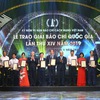Farm produce face hurdles to make inroads into EU

While the national agriculture sector is poised to enjoy numerous opportunities brought about by the European Union-Vietnam Free Trade Agreement, many of its export items are likely to face new challenges when attempting to penetrate the stringent EU market.
The EU currently represents the second largest export market for Vietnamese agro-forestry-fishery products after China, importing many of the country’ key farm produce such as seafood, coffee, cashew nuts, and tropical vegetables. Meanwhile, the country’s main imports from this market are eggs, milk, honey, beef, chicken, pork, and vegetables.
Once the EVFTA comes into full effect, import duties imposed on Vietnamese agricultural products, for instance, broken and long grain rice, will be slashed to 0%.
With regard to seafood, fruit and vegetables, the EU is committed to eliminating 50% of tax lines, while the remaining 50% of tax lines will be removed in the subsequent period in line with the five and seven year roadmap.
The export growth of a number of agricultural products will see an upward trajectory until 2025 due to the effects of the trade pact. Accordingly, rice, sugar, pork, forest products, and cattle and poultry will increase by 65%, 8%, 4%, 3%, and 4% respectively by 2025.
Most notably, the impending trade deal is expected to contribute to attracting investment projects in the local agricultural sector, accelerating the transfer of technology, renovating production methods within the agricultural sector, increasing output, and product quality, thereby allowing Vietnamese agricultural products to meet the stringent standards set by EU importers.
Economists believe that in order to fully opitimise the opportunities offered by the EVFTA and subsequently penetrate the EU market, Vietnamese agricultural products must first overcome the EU’s technical barriers relating to the rule of origin, product quality, or intellectual property protection.
Economic expert Vu Vinh Phu says the country’s involvement in new generation FTAs such as the Comprehensive and Progressive Agreement for Trans-Pacific Partnership (CPTPP) and the EVFTA is expected to enhance national competitiveness since Vietnam has an underdeveloped agriculture compared to other advanced economies. This can be seen when Vietnam is compared to other places in terms of labour productivity, product quality, and prices.
Moreover, the agricultural sector faces stringent competition from farm produce originating from other regional countries due to small scale production, a low level of science and technology, in addition to limitations in terms of food safety, hygiene, and high production costs, Phu notes.
Once the EVFTA fully comes into effect, dairy products and livestock meat from other countries will begin to flood the Vietnamese market at cheaper prices and at a higher quality in comparison to local items, leading to a great number of challenges for domestic farm produce.
Phu therefore emphasises that local farmers and enterprises should move to overcome these impending challenges by creating high-quality products, proactively improving production capacity, seeking new markets, and developing brands for domestic agricultural products.
Concerning exports, the substantial reduction of import tax imposed by EVFTA signatories will encourage the development of local agricultural production.
Economists underline the need to overcome technical barriers regarding plant and animal quarantine, while also ensuring other fundamental factors relating to environmental protection, social responsibility, and distribution for farm produce exports are maintained.
Experts also state the importance of using science and technology in the production of agricultural products in the future as these products account for 70% of the total domestic consumption market.
“Once we penned the trade pact, we are committed to playing by the rules, especially with regard to food safety, hygiene, competitive prices, and environmental standards. Everything should be done in a a transparent and clear manner,” concludes Phu.





